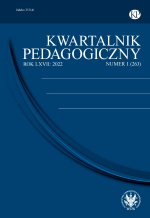Self-authoring characteristics of the Montessori School graduates
Self-authoring characteristics of the Montessori School graduates
Author(s): Beata BednarczukSubject(s): Social Sciences, Education
Published by: Wydawnictwa Uniwersytetu Warszawskiego
Keywords: concept of self-authorship; theory of self-authoring personality; self-authoring characteristics; Montessori school graduates; Montessori education
Summary/Abstract: The modern world requires a new mindset for people to enable them to become self-evaluating human beings. Kegan (1994) termed this complex system of mind the self-authorship. This is the ability to generate belief systems and intrapersonal states internally. The self-authorship analyses are culturally diverse. This paper presents two theories, namely the concept of self-authorship by Baxter Magolda (1998, 2001) and Obuchowski’s (2000, 2006) theory of self-authoring personality. The latter remains a framework of the description of central psychosocial attributes for the self-authoring personality of Montessori School graduates. The self-authoring studies of diagnostic character aimed at qualification of the authoring personality standard as well as subjective denotations of authoring attributes of the Montessori School graduates. The study covered 69 former students (56.5% women, 43.5% men) of the state Primary Montessori School in Lublin. The self-authoring personality standard was qualified using The Self-Authoring Personality Questionnaire elaborated by Obuchowski and colleagues (Blachnio & Obuchowski, 2011). The personal denotations conferred on authoring attributes were examined by means of the questionnaire My Experiences based on the adaptation of Self-Confrontation Method by Hermans (1991). The level of self-authoring personality in female and male groups was high and characterised by similar values. In the personal statements the persons being examined described themselves as those who perceive themselves as a source of behaviour and the own aims were object of their projects designed for accomplishment in relation with the other people. As follows from the data, the participants of the study acquired skills indispensable for making individual decisions about themselves and the outer world.
Journal: Kwartalnik Pedagogiczny
- Issue Year: 263/2022
- Issue No: 1
- Page Range: 93-109
- Page Count: 17
- Language: English
- Content File-PDF

